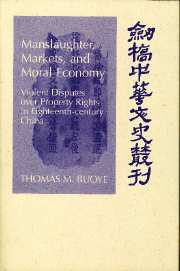 Manslaughter, Markets, and Moral Economy
Manslaughter, Markets, and Moral Economy Book contents
- Frontmatter
- Contents
- List of Maps, Figures, and Tables
- List of Qing Dynasty Emperors' Reign Dates
- List of Weights and Measures
- Acknowledgments
- Introduction
- 1 Economic Change, Social Conflict, and Property Rights
- 2 “Population Increases Daily”: Economic Change during the Eighteenth Century
- 3 “As Before Each Manage Their Own Property”: Boundary and Water-rights Disputes
- 4 “Crafty and Obdurate Tenants”: Redemption, Rent Defaults, and Evictions
- 5 Temporal and Geographic Distributions of Property-rights Disputes in Guangdong
- 6 Violence North, West, and South: Property-rights Disputes in Shandong, Sichuan, and Guangdong
- 7 “You Will Be Rich but Not Benevolent”: Changing Concepts of Legitimacy and Violent Disputes
- 8 Conclusion
- Appendix
- Bibliography
- Index
8 - Conclusion
Published online by Cambridge University Press: 28 October 2009
- Frontmatter
- Contents
- List of Maps, Figures, and Tables
- List of Qing Dynasty Emperors' Reign Dates
- List of Weights and Measures
- Acknowledgments
- Introduction
- 1 Economic Change, Social Conflict, and Property Rights
- 2 “Population Increases Daily”: Economic Change during the Eighteenth Century
- 3 “As Before Each Manage Their Own Property”: Boundary and Water-rights Disputes
- 4 “Crafty and Obdurate Tenants”: Redemption, Rent Defaults, and Evictions
- 5 Temporal and Geographic Distributions of Property-rights Disputes in Guangdong
- 6 Violence North, West, and South: Property-rights Disputes in Shandong, Sichuan, and Guangdong
- 7 “You Will Be Rich but Not Benevolent”: Changing Concepts of Legitimacy and Violent Disputes
- 8 Conclusion
- Appendix
- Bibliography
- Index
Summary
Understanding violent disputes over property rights in land in the broader context of the economic developments of the eighteenth century has been the primary task of this book. At first glance, the task does not seem difficult. Violent disputes were a widespread problem, and this book presents only a sampling of the voluminous evidence of the most violent disputes, those ending in homicide. As these homicide reports made their way up the bureaucratic ladder to Beijing, the problem of violent disputes over land was apparent and troubling to provincial and central-government officials, as noted in their reports to their superiors. There also is overwhelming and unmistakable evidence of the unprecedented demographic boom and economic development during the eighteenth century. The historical record demonstrates that the Chinese economy was increasingly commercialized and that peasant households were active participants in the market, with all the attendant benefits and risks that this entailed. Official reports also reveal that the economic changes that were taking place in the eighteenth century were abundantly clear to Qing officials. Government concern about overcrowding was evident in the formulation of land reclamation and taxation policies that also addressed the potential social costs of economic and demographic expansion, such as increased lawsuits and feuding over land and landless peasants being driven into banditry.
While many of these concerns and proposed remedies had deep roots in Chinese economic thought, it is also clear that some eighteenth-century officials were seriously reconsidering the fundamental economic role of the state. Recent research by Helen Dunstan has identified the “sprouts of liberalism” in the debate among high-level officials over the role of government in the economy during the Qianlong reign (1736–95).
- Type
- Chapter
- Information
- Manslaughter, Markets, and Moral EconomyViolent Disputes over Property Rights in Eighteenth-Century China, pp. 219 - 229Publisher: Cambridge University PressPrint publication year: 2000


